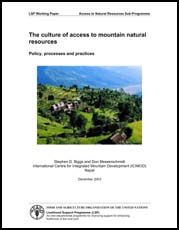
The Culture of Access to Mountain Natural Resources
Policy, Processes and Practices
Stephen D. Biggs and Don Messerschmidt
International Centre for Integrated Mountain Development (ICIMOD)
Nepal
December 2003
Cover photograph by Frits Ohler
FOOD AND AGRICULTURE ORGANIZATION OF THE UNITED NATIONS
Livelihood Support Programme (LSP)
An inter-departmental programme for improving support for enhancing livelihoods
of the rural poor.